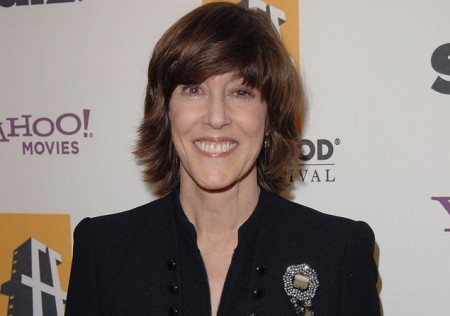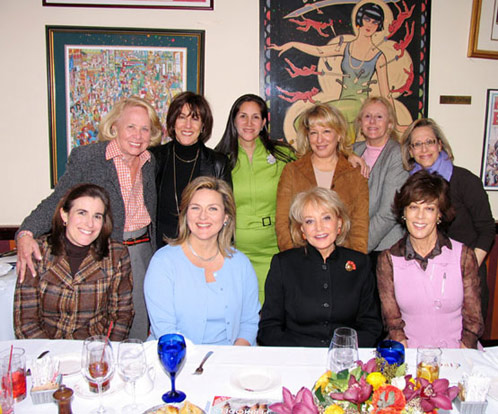IndieWire
The Story of Hollywood’s Forgotten Feminist Crusaders
By Vikram Murthi | Criticwire
February 29, 2016 at 12:45PM
Though it may seem like the fight against gender discrimination in Hollywood has only just begun, there have been crusaders in the past who have desperately tried to change the tide. For Private Standard, Rachel Syme profiles The Original Six, a group of six female directors who tried to challenge the Hollywood machine only for the industry to try to erase them.
Nell Cox lives on the Upper West Side in one of those kooky apartments you see only in Nora Ephron movies – quaint with a certain country flair (her living room furniture includes a daybed topped with a vintage quilt), filled with precarious stacks of books and papers and knicknacks and the odd glass trophy commemorating a long creative life, the kind of perfectly charming mess that indicates an artist is in residence.
When I arrive, on a freezing afternoon in early February, her radiator is hissing like a threatened snake. Cox, who is in her “seventies and happy with my age,” doesn’t seem to mind; we have a mission to complete. I am at her apartment to talk about her experiences as part of “The Original Six,” a group of women directors who spoke out against gender discrimination in Hollywood in 1979, and who formed the Women’s Steering Committee, a branch of the Director’s Guild of America that advocates for female employment on film and television sets at the directing level.
Cox and I are speaking on camera – her daughter, Rebecca, who is also a filmmaker and lives in Brooklyn, has never before heard her mother sit down and speak about her activism, and she wants to capture the interview for the family archives. “She never talks about this,” Rebecca says to me, handing me a glass of water and adjusting her camcorder (her father, who also works in the industry, handles a second camera nearby; no home movie made by a triad of filmmakers could ever just have one angle).
“When we heard she was going to speak about this time in her life again, I knew I had to be here.”
And so here we all are: me, Cox, who wears bookish glasses and speaks in a lilting Kentucky drawl, and two family documentarians, gathered to talk about how it was that Cox never got to direct a feature film, her one, big, glimmering dream.
She came close – she came close so many times – but now she considers the dream to have been more of a mirage. Cox directed several episodes of TV (“M.A.S.H,” “The Waltons,” “Ghostwriter,” “L.A. Law”) and even a made-for-PBS “women’s western” called “Liza’s Pioneer Diary” in 1976, but no longform treatment she wrote for a big studio film ever made it past the development stage.
At one point during our talk, Cox slides a sheet of paper across the table to me, filled with ideas for films that she had over the years. “Here are 10 full scripts I wrote,” she says, “and there are probably 25 more treatments. God, this is depressing. I have pages and pages and pages of these things.”
Many of the ideas are solid: a buddy road-trip comedy called “Bad Girls,” a biopic of the revolutionary Emma Goldman, an adaptation of Kate Chopin’s “The Awakening,” a Masterpiece Theater biography about the famous British actress and outspoken abolitionist Fanny Kemble.
But, as Cox admits, they are all women’s films. They tell women’s stories. And in the 1970s and ’80s, when she lived and worked in Hollywood, those stories were not on most studios’ wish lists (they still aren’t, but more on that to come).
“With the Emma Goldman film, Harold Ramis co-wrote it and wanted to produce it,” she says, sighing, looking a little misty and far-off. “He was at the height of his career! And we got Bette Midler, who would have been great. But…it was a period piece. And it would have been a big, expensive film. And I was attached to direct. Harold, to his credit, never said he should direct it, which would have gotten the thing made. No, he was wonderful that way. But we worked on that for years, and nothing came of it.”
Cox’s vision, when she moved to Los Angeles from New York in the mid-’70s, was to make an entire series of genre films, all from a woman’s point of view: a gender-bending sci-fi, a war story with a female hero at the center. She only got as far as making the Western.
“I thought, they’re making all the genre movies where the men are the heroes and I want to flip this concept on its ear,” she says. “Looking back, this seems naïve. What was I thinking? But the fact that this seems naïve perhaps says something important about our industry. At any rate, this vision was rejected.”
At that point, Cox’s voice trails off and she decides that she needs to take a little break, that she is growing weary of talking about herself. But before I pause the tape, I ask why she thinks more people don’t come and find her, ask her to tell her true Hollywood war stories. “I just think our experience was so long ago, and it was kind of sad,” she says. “So younger women may think, ‘Let’s not talk to them. Let’s just move forward.'”







